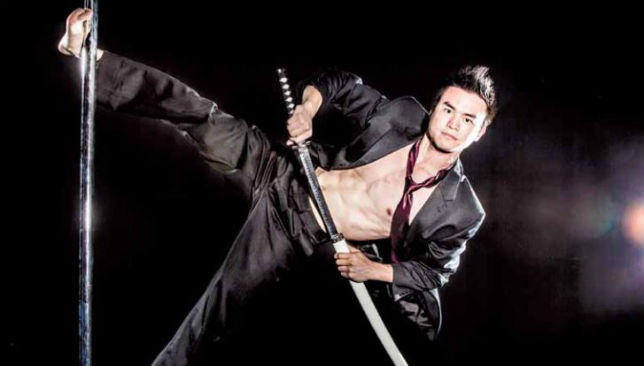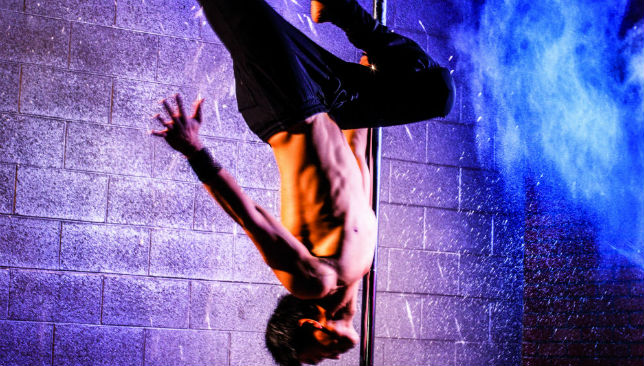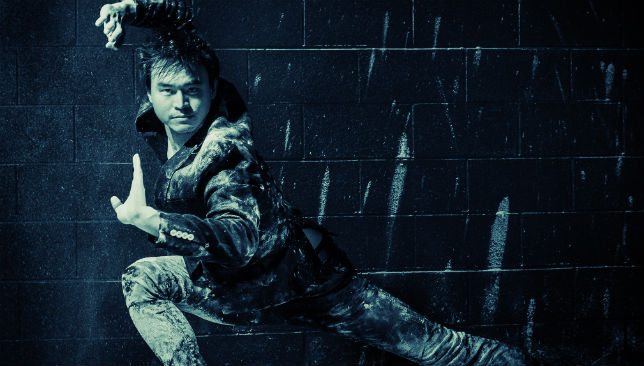
Dr. Kennth Kao or ‘Pole Ninja’, as he is commonly referred to in the Pole Dance community, has made a niche for himself for creating a unique discipline called Pole-Kour, which is a fusion of Pole Dancing and Parkour.
Having mastered several martial arts, he earned that unique moniker after he pioneered the move of jumping between poles in his performances.
Being one of the very few pole dancing men in the industry, Dr. Kao shares his classic ‘fish out of water’ story with Sport360.
Tell us a bit about yourself
My name is Kenneth Kao; I am a doctor of Chiropractic that is why ‘Doctor Ken Pole Ninja’ came in to being. I am 33 years old and I am from Boulder, Colorado.
What is PoleKour?
PoleKour is the combination of the concepts and the techniques of Pole Dancing and Parkour. I practiced Parkour for 12 years and taught it for seven years, and then I used it to apply it to pole.
Pole dancing is probably the direct opposite of Parkour, when it comes to movement, technique, style and aesthetics. So, it has been an interesting exploration.
How did you get involved with pole dance?
I was teaching a Parkour class and one of students was a pole dancer, and she ended up doing a really cool move, it’s called the kneehold, like a human flag but it is done with the knees and I was like I got to learn that.
So she basically told me about pole and at the time, none of the studios accepted any men in my area. I did some research, I called a couple of studios and they told me, ‘no, you can’t join.’
Eventually I gave up, but then at my clinic, one of my new patients came in and turns out she was a pole dance teacher. So I asked her if she could talk to the studio and see if I could take classes with her, and then I became the first male pole dancer in that studio.
What was it like for you to be the only male in a female-oriented class?
It was very strange at first, definitely because I am used to being around all guys, so this was like the direct opposite of it. But it kind of becomes the same thing, people just get used to you once they realize that you are not there to be a creeper.
Interestingly enough, after finishing two months of training, I ended up loving it so much that I would train by myself. I actually stopped going to classes after about three months and just did it by myself.
So I pretty much ended up creating a lot of moves that are more my style, and in a way that comes from failing… a lot.

What sort of impact did it have on you?
Honestly, I started doing pole mostly because I was going through a divorce. At that time I really needed something that would give me a sense of success.
Pole is actually very goal-oriented and is about getting moves right. Once you’re past that and reach a more advanced level, then it is no longer about the move, but about fluidity and your overall expression through your movements.
At first, it was all about me wanting to achieve something, so it was my therapy at that time.
What were some of the challenges you faced?
The emotional aspect of pole was major challenge for me. Also, I am not a dancer, I don’t come from a dance background, and the aesthetics of the majority of the pole industry is very much contemporary ballet and traditional dance styles, and it’s growing now.
When I started, it was really not the case, but now I am definitely seeing a fusion of different dance styles into pole.
There is a stigma associated with men taking up pole dancing, what is your take on it and how do you tackle it?
One of my goals is to actually create performances and videos that anyone can watch, including grandmothers without feeling uncomfortable.
It is not because I have a problem with other styles of dance, but I just want to underline shed light on another aspect for people who don’t know what pole is. Especially if you’re a male, the stigma is that you’re gay and you’re a stripper.
Definitely, such comments have come up during my journey. Usually it is from people I don’t know, who come up to me with comments that are quite ignorant. It doesn’t really bother me because most of my patients know that I am a pole dancer. This is sort of this new identity I have taken.
In case of women, the non-pole dancers were open to it. I live in a liberal area, so I don’t think any of them judged me. My parents were definitely a little sceptical and were not sure as to what was going on. My dad even used the phrase: ‘I haven’t told your mother, yet’. But in the end, they were both okay with it.

Regardless of the gender issue, pole dancing in general has a very negative perception in society, what is your view on it?
I come from a conservative background. So, one of my biggest fears was what my friends are going to think of it.
And yes, many of them thought about ‘stripping’ and other things, but as I have grown in the community, I have started to really open my mind.
The most important thing is that many new pole dancers, when they come into the sport; they make such a big deal about reinforcing the point that they are not strippers.
Then they say that strippers are the bad ones and that is also a negative thing. I don’t think you need to attack another group to just build yourself up.
So, I think it is important to focus on what you want to do with an apparatus – it is just a steel bar, that’s all it is. Whatever direction it is facing, if it is horizontal or vertical – it is just a steel bar.
My perception has also changed tremendously from what it used to be, because I have met amazing people through this sport and I am actually working on a book right now. As I have been travelling in the last few years, I have interviewed people and gathered stories about their personal experiences with pole.
We have an ex-Navy admiral, who now runs a front desk for his daughter who owns a pole dance studio. I know a girl who was a sex-trafficking victim after being kidnapped and now uses pole to recover from the trauma she endured. We have an undercover police officer, who poses as a pole dancer to bust criminals.
What is your advice to people who are taking up pole?
People often make excuses that they are not strong enough or are not flexible enough for pole. One thing I have seen in the pole dance community is that the people are proud that they are pole dancers.
They walk in and say, ‘yes, I pole dance and you can think of whatever you want about it, but what actually happens is up to me’. For example, you can.